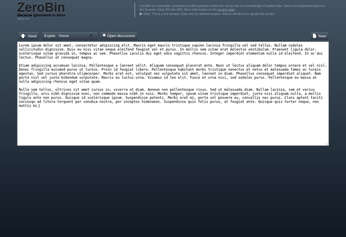Host Your Own Secure Pastebin with ZeroBin

Productivity Sauce
A webapp for storing text fragments and code snippets can come in handy in many situations, and there are several third-party pastebins at your disposal. But if you prefer to host a pastebin on your own server, ZeroBin is right up your alley. For starters, ZeroBin is rather easy to install. Grab the latest version of the application, extract the download archive, move the resulting directory to the document root of your server, and ZeroBin is ready to go.
Using the application is not particularly difficult either. Paste a text or code fragment, press the Send button, and use the generated URL to share the specific page. For each pasted snippet, you can specify an expiration period and enable comments. The latter feature can be useful when you want not only to share a text fragment or code, but also receive feedback from other users. All the data you send through ZeroBin is compressed and encrypted in the browser before they are pushed to the server using the 256-bit AES encryption. So even if the server is breached or seized, the ZeroBin data will remain safe from prying eyes. Because the URL generated for each pasted snippet contains both a unique identifier and a decryption key, the link is usually very long and practically impossible to remember. Fortunately, ZeroBin features the Shorten URL button which lets you shorten the URL using the SnipURL service.
Despite being at the alpha stage of development, ZeroBin is surprisingly stable and usable, but you should use it with caution anyway.
comments powered by DisqusSubscribe to our Linux Newsletters
Find Linux and Open Source Jobs
Subscribe to our ADMIN Newsletters
Support Our Work
Linux Magazine content is made possible with support from readers like you. Please consider contributing when you’ve found an article to be beneficial.

News
-
Plasma 6.3.4 Now Available
Although not a major release, Plasma 6.3.4 does fix some bugs and offer a subtle change for the Plasma sidebar.
-
Linux Kernel 6.15 First Release Candidate Now Available
Linux Torvalds has announced that the release candidate for the final release of the Linux 6.15 series is now available.
-
Akamai Will Host kernel.org
The organization dedicated to cloud-based solutions has agreed to host kernel.org to deliver long-term stability for the development team.
-
Linux Kernel 6.14 Released
The latest Linux kernel has arrived with extra Rust support and more.
-
EndeavorOS Mercury Neo Available
A new release from the EndeavorOS team ships with Plasma 6.3 and other goodies.
-
Fedora 42 Beta Has Arrived
The Fedora Project has announced the availability of the first beta release for version 42 of the open-source distribution.
-
Dash to Panel Maintainer Quits
Charles Gagnon has stepped away as maintainer of the popular Dash to Panel Gnome extension.
-
CIQ Releases Security-Hardened Version of Rocky Linux
If you're looking for an enterprise-grade Linux distribution that is hardened for business use, there's a new version of Rocky Linux that's sure to make you and your company happy.
-
Gnome’s Dash to Panel Extension Gets a Massive Update
If you're a fan of the Gnome Dash to Panel extension, you'll be thrilled to hear that a new version has been released with a dock mode.
-
Blender App Makes it to the Big Screen
The animated film "Flow" won the Oscar for Best Animated Feature at the 97th Academy Awards held on March 2, 2025 and Blender was a part of it.

